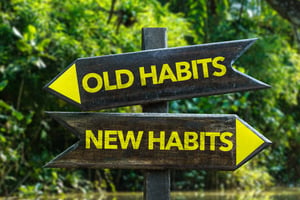‘Lockdown behaviour ‘has taken hold of most of us, even the most resilient and resistant! As a result of drastic changes in lifestyles, habits and schedules the basic freedoms and confidences we hold true have been challenged.
Fear. Isolation. Uncertainty. Dread.(*1) are basic emotions familiar to all of us. These quickly elicit anxieties by their meaning. Enter – Covid-19 (Sars-COV2) pandemic in 2020.
An unintended side-effect of ‘lockdown behaviour’ is heightened anxiety in most of us. As a result of varying stressors such as children not being at school, working from home, not working, lack of access to self-care, medical concerns, restricted personal space and threats to health security. Not to mention a loved one or yourself contracting or dying from the virus. Anxiety is another word for fear, which we know is essential for survival.
Is all this anxiety during ‘lockdown’ normal?
Researchers (*2)sight that years of evolution has trained the human brain to operate in a “a better safe than sorry” mode. For instance, we will avoid a particular road known to be extremely busy, and choose to drive an alternate route, even if its unseen. The fear of being ‘late’ or stress of simply sitting in traffic longer than desired aids your decision.
Here is an excellent segment about anxiety and how it relates to our current ‘lockdown behaviour’:
Consider anxiety as a way your body is alerting you to some sort of fear of the future, failure, or embarrassment (ALL perceptual)
 Fear of future – uncertain about the pandemic effects on you or your family, when it will it be over?, will it ever be over? What’s next? Finances concerns, School?, Business? Etc..
Fear of future – uncertain about the pandemic effects on you or your family, when it will it be over?, will it ever be over? What’s next? Finances concerns, School?, Business? Etc..
Fear of failure – have I done enough to protect myself, my family?, have I done enough with my time off?, did we stock up enough? Etc…
Fear of embarrassment – wearing PPE so I do not get sick or be seen “passing” it around, being fined for ‘breaking the rules’, actually getting sick (although would be unpleasant and dangerous potentially)
Consider the long-term implications of this sort of reaction (anxiety) to the stressor of ‘lockdown’.
For many who have stable occupations, enjoyment opportunities and social interactions you can reduce the emotions of anxiety quite well, even into the long-term. But for some, the anxiety can be so constant and severe that the prolonged effects can be profound. For those with underlying anxiety and depression it can be challenging to navigate ‘what is threat’ at the best of times. When there is perceived threat, such is the case with the Covid pandemic “all bets are off” so to speak.
Some of the physical effects for most are:
- Chronic back pain and muscle tension
- Gastrointestinal pain-->
Due to strong GUT-Brain connection heightened, long term anxiety can lead to IBS (irritable bowel syndrome) and functional dyspepsia (FD). The latter is disturbed food processing in the upper GI causing pain and discomfort.
- Eczema
- Insomnia
- Sexual dysfunction

- Musculoskeletal pain – joints
- Weight gain-->
Anxiousness or stress can increase levels of cortisol and epinephrine hormones at inappropriate times of day. The result being more blood sugar released. Also, cravings for “comfort foods” increases which can cause the brain to produce more serotonin. Overall, this cascade of events increases fat storage and therefore weight gain.
Anxiety can be a good thing
Short-lived stress can increase progress and catapult creation of new things. In this new world of ‘lockdown’ and masking we aim to prevent getting and spreading the Covid virus. The reality is most of us will not get the virus, and all of us will be affected by the ‘lockdown’. This affect varies depending on the position and state you were in from the beginning. Those of us that chose to “make something of it” can be as stressed as those who were “stopped” or “frozen” by the drastic change due to ‘lockdown’. Research (*2) shows that so termed high performers are driven by stress and anxiety to produce or perform. However, their sense of control is lost in this situation which increases their stress over the long-term.
Everyone handles the anxiety of ‘lockdown behaviour’ differently
The benefits of keeping moving, staying active in an otherwise sedentary situation are well-researched. Rather than be in ‘freeze mode’ or ‘overtaxed mode’ its also important to practice mindfulness during this time. There are a lot of options to suit different personalities and needs. Regular meditations (specific to needs) and getting into nature (water, forests, parks) are essential to coping during these times. When we are practicing isolation and restricted from accessing the things that helps us cope with the pressures and anxieties, there is concern for many people’s welfare both of mind and body. Using tools to cope and adapt during this ‘lockdown’ can be very helpful and encouraging for a brighter outlook going forward.
References:
(*1) Time magazine-sp Ed. M Heid 'Beyond Stress' 2020
(*2) Anxiety:An Evolutionary Approach; M Bateson, Can J Psychiatry 2011;56(12)